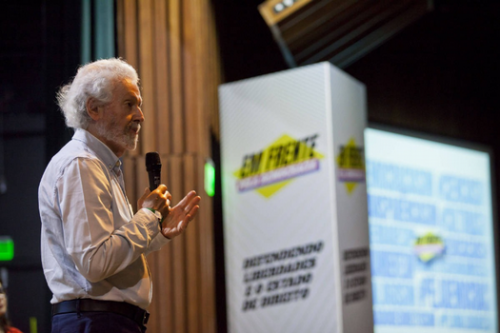Counterpoint to Davos showed that neoliberalism is not the only way
The idea that neoliberalism is the only way forward, that there is no alternative, is over. The message "another world is possible" has won eminent hearts.
- Opinión

The World Economic Forum (WEF) in Davos in 2000 proclaimed the triumph of neoliberalism. The economy, freed from restrictions, controls, regulations and rules, would lead the world to prosperity and solve all our social problems.
Restrictions that sought to preserve labor rights, human rights, environmental protection and guarantee consumer rights were considered obstacles to economic development and progress. The presence of dictators in Davos, received with all honors, gave support to those who believed that democracy, with its rules, hindered the actions of those who wanted total market freedom.
Extremely bothered by the media watching this speech and the praise of neoliberalism, I had the idea of creating the World Social Forum (FSM). It was necessary to create a counterpoint and oppose the WSF, to show that the economy needs to be at the service of social progress. That human rights, the preservation of the environment and democracy are fundamental values for the civilization process, for life on the planet, for the well-being of all -and not just some. That the free market, without rules and limits, means promoting the law of the jungle where the strongest becomes stronger and the weakest becomes weaker - or disappears. This results in the brutal increase of inequalities.
When examining the indicators of inequality in the world, where the richest 1% concentrate the same wealth as the other 99%, the question I always asked myself was: how is it possible that so few dominate so many? How can we accept such inequality? One of the causes is the fact that a large part of the population was convinced that there would be no alternatives, no other choices; and, on the other hand, the fragmentation of civil society, which would find it difficult to articulate, to come together, to acquire political and social strength, to promote change and influence public policies.
The WSF would be a process led by social organizations that would make visible concrete proposals and initiatives for social progress, showing that another world is possible, and would facilitate connections, alliances and partnerships between organizations and social leaders.
Several people and organizations embraced the idea and, in January 2001, the WSF was launched in Porto Alegre. Since 2004, the WSF has won the world. Numerous world, regional, national, local and thematic forums spread to all continents. To celebrate its 20th anniversary, the WSF, which began on January 23rd and runs until January 30th, will be virtual because of the pandemic.
We accumulated defeats and victories. The inequalities remain enormous, and environmental devastation continues. Some important countries have elected governments that deny all the values of democracy, human rights and environmental sustainability. Progressive governments have implemented important social policies, but some have surrendered to market logic and the temptations of power. Several networks and alliances have been formed at local and global levels. Important movements gained power and scale: feminist, antiracist, indigenist, environmentalist, human rights, valuing diversity, reducing inequality, promoting participatory democracy. Important advances in legislation, public policies, legal norms and international treaties were obtained.
The idea that neoliberalism is the only way forward, that there is no alternative, is over. The message "another world is possible" has won eminent hearts. The WSF was only able to become a reality thanks to thousands of militants and organizations that believed in the idea and committed themselves to holding the first forum 20 years ago and that organized and participated in all the following meetings. And that, mainly, they continue fighting for a better world. To these institutions and people, I pay tribute.
- Oded Grajew, idealizer of the World Social Forum, he is president emeritus of the Ethos Institute and counselor of the Sustainable Cities Institute and Oxfam Brazil.
Article originally published in https://www1.folha.uol.com.br/opiniao/2021/01/20-anos-de-forum-social-mundial.shtml, in Folha de S.Paulo, Brazil's largest newspaper
Del mismo autor
- El contrapunto a Davos mostró que el neoliberalismo no es el único camino 28/01/2021
- Le contrepoint de Davos a montré que le néolibéralisme n'est pas la seule voie 28/01/2021
- Counterpoint to Davos showed that neoliberalism is not the only way 28/01/2021
- Sentença de morte 14/11/2008
- Robo de alma 06/03/2003
- Roubo de alma 05/03/2003
FSM
- Sergio Ferrari 10/02/2021
- Sergio Ferrari 10/02/2021
- Sergio Ferrari 08/02/2021
- Celeste Serra 02/02/2021
- Sergio Ferrari 01/02/2021
